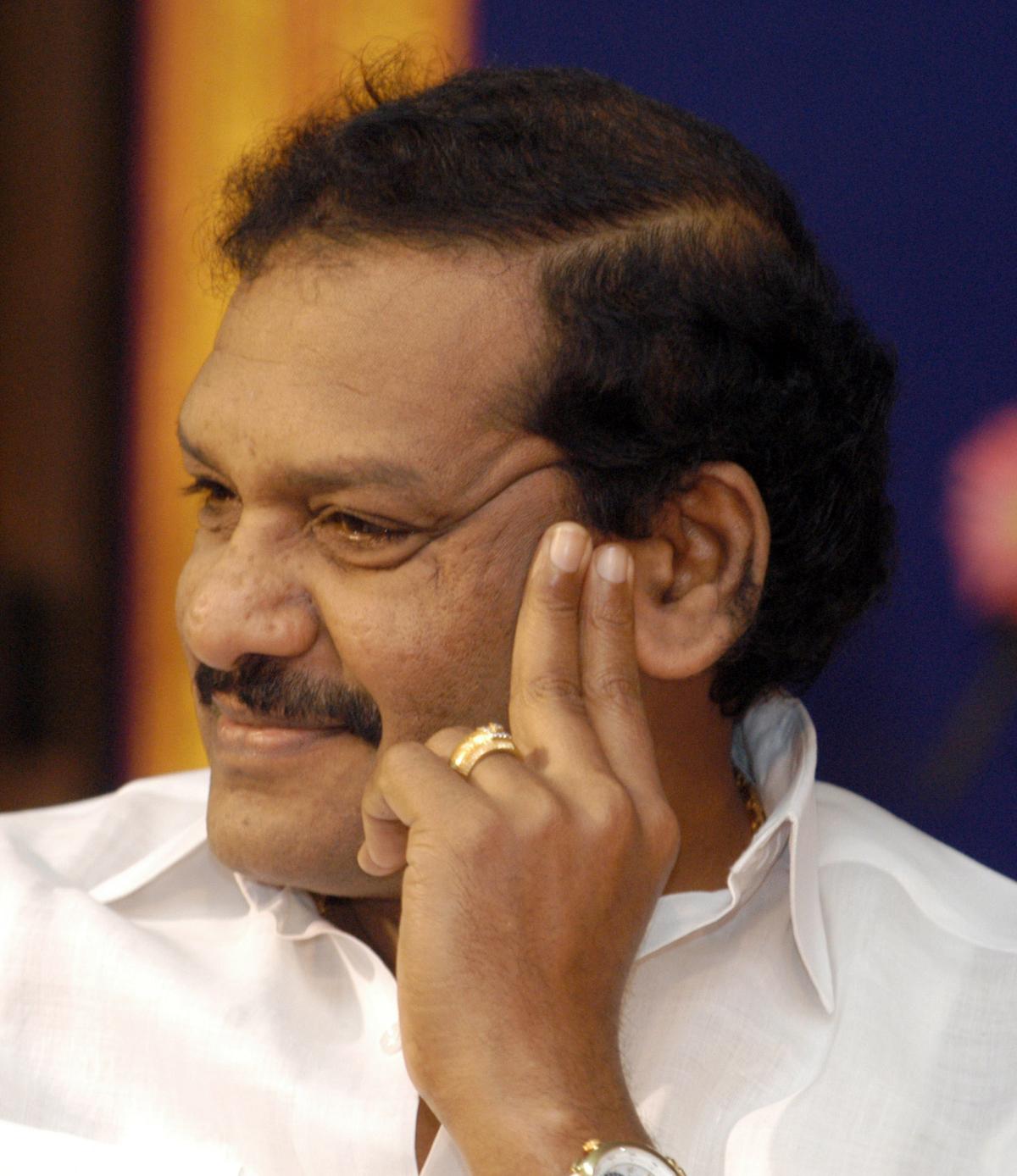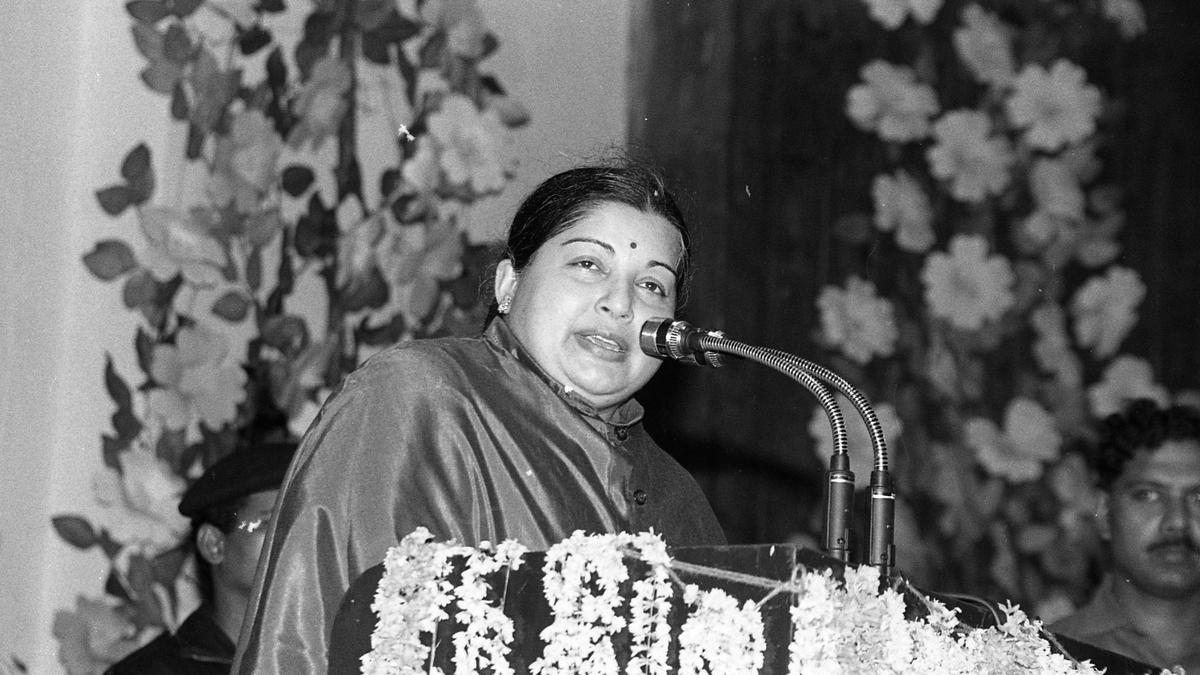Former Tamil Nadu Chief Minister J. Jayalalithaa’s caste has become a subject matter of discussion, almost nine years after her passing. Viduthalai Chiruthaigal Katchi (VCK) leader Thol. Thirumavalavan recently triggered a row by alluding that All India Anna Dravida Munnetra Kazhagam (AIADMK) founder M.G. Ramachandran (MGR) was instrumental in facilitating the “intrusion” of a Brahmin (Jayalalithaa) into the Dravidian movement and laid the path for her leadership of a Dravidian party.
In her early years of heading the AIADMK after MGR’s death and later becoming the Chief Minister in 1991, Jayalalitha (as she spelt her name then) had endured strong criticism from her political opponents, notably the DMK, on account of her upper caste origins.
Responding to taunts on her Brahmin roots, she once declared in the Legislative Assembly, “Naan pappathi thaan (I am a Brahmin woman).” This was sometime in 1991. However, records indicating when and in what context she made this statement are not readily available.
Nonetheless, a perusal of The Hindu’s archives show that in September 1991, political discourse in Tamil Nadu was dominated by what was perceived an anti-Brahmin campaign by the DMK. Under former Chief Minister M. Karunanidhi’s leadership, the DMK had announced its intention to expose the “group” in power then. Karunanidhi had clarified his statement (on the ‘group’) should not be misconstrued to mean another anti-Brahmin movement would be launched.
Notwithstanding his claim, on September 23, 1991, several members in the Assembly condemned the “anti-Brahmin campaign unleashed by the DMK recently.” Law Minister K.A. Krishnaswami referred to one such campaign in the DMK mouthpiece Murasoli and asked was it not an attack on a particular community and would it not amount to inciting violence. “The anti-Brahmin attitude prevalent now is only followed by the DMK, which is a casteist organisation,” he charged.
Labour Minister C. Aranganayagam contended the AIADMK was following DMK founder C.N. Annadurai’s policy of not discriminating against any community. But, it was the DMK, which professed to follow the path shown by Annadurai, that was following a wrong policy.
“Buttressing the AIADMK stand, the Law Minister argued that there was a question whether the DMK, at the time of its formation, should be an organisation of Dravidians or for the welfare of Dravidians. It was Annadurai who decided that persons belonging to any single community should not be discriminated against because of their birth and said anyone could become a member of the organisation,” a report in The Hindu said.

Congress (I) MLA S. Peter Alphonse had then charged that a sustained and planned anti-Brahmin campaign had been going on for the last 15 days. It was undertaken to threaten the Chief Minister, frighten her and unseat her at a time she embarked on a programme of wiping out anti-national forces. It was aimed at creating an atmosphere of hatred in the State, he said, adding raising the issue in the House that day was the next stage of the campaign.

Peter Alphonse. File
| Photo Credit:
The Hindu Archives
Interestingly, the then Finance Minister V.R. Nedunchezhian said five or six Brahmins were working in Murasoli but what the DMK was now indulging in was for “political reasons.”
The issue dominated the proceedings in the Assembly on the following day too. Chief Minister Jayalalitha said, “The anti-Brahmin campaign of the DMK deserves to be dismissed with contempt.”
She said the members need not have any apprehension that the DMK would succeed in its designs to whip up communal passions for unseating the government. She charged the DMK had “miserably failed” when it sought to brand MGR a Malayali. “None would have forgotten the vicious campaign unleashed by the DMK and how people rejected it with scorn. Such intimidation tactics did not affect the MGR Government,” The Hindu reported on her speech.

“In her case too, the DMK had adopted a similar strategy of labelling her as Brahmin in the hope of turning the rest of the communities against her. Ms. Jayalalitha said that right from the day she entered active politics in 1982, the DMK had been deriding her as a Brahmin woman. This cut no ice. The DMK attacked her in the same vein, at meeting after meeting, when she contested the election to the Assembly from Bodinaickanur in 1989. But the people returned her with a massive margin,” the report said. She asserted the caste factor had become irrelevant in politics.
During the proceedings, Mr. Alphonse, had urged that the word “pappathi” be expunged from the Assembly records as it might be considered derogatory and hurt the feelings of a community. However, Jayalalitha did not agree with him. “It should very much be on record so that posterity will know to what extent a particular community has been ridiculed,” she said.
In a report ‘Jayalalitha’s 100 days: A positive balance-sheet’, published on October 6, 1991, The Hindu correspondent wrote: “The DMK which had given six months to the AIADMK Government to demonstrate its worth appears already in jitters. It has made Ms. Jayalalitha its prime target and started a sustained campaign portraying her as ‘papathi’ (Brahmin woman) and a symbol of Aryan domination over the Dravidian Tamils, thereby taking politics back to the pre-lndependence days. All that, however, has not deterred Ms. Jayalalitha from going ahead with her programmes with the AIADMK solidly behind her.”
Published – August 13, 2025 05:00 am IST


